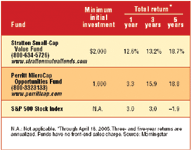Article
Funds of the Month
Small funds
Does the size of a mutual fund matter? Can a small fund outperform a large one? The short answer: It depends.
For the purpose of this article, we're defining "small" funds as those with less than $300 million in net assets under management. Small funds are sometimes perceived to have a performance advantage over larger funds, because a small fund can purchase what is, for it, a large position in a particular company, without driving up its stock price. Small funds are also usually more agile than large funds, because decisions at smaller funds generally get made faster.
A large fund, on the other hand, must be cautious when it buys or sells a big position in a stock, as that action alone may effectively move the price of the stock. The managers of a large mutual fund must carefully consider how much their actions will change the investment landscape, as well as the stock's performance and its effect on the fund.
Expenses are another area where small mutual funds are vulnerable. Looking at Morningstar data through March, 2005, the smallest 25 percent of funds have average expense ratios that are 0.57 percentage points higher than those of the largest 25 percent.
Should you consider a small fund? Yes, if you feel the risk is acceptable in relation to the fund's performance and expense level. Here are a couple of good ones, both of which have considerably outperformed the S&P 500 over the past one, three, and five years.
Options Stratton Small-Cap Value Fund. This fund is for long-term investors who are willing to accept more market risk in return for the potentially higher returns that may come from investing in small-cap companies (generally those with a market capitalization of less than $500 million). The fund managers look for well-established US companies that they believe are undervalued. This strategy has served them well; the fund ranks in the top five percentile within its category over the past one, three, and five years. Some of its winning investments for the first quarter of 2005 were: Newfield Exploration (up 25.8 percent), Cabot Oil & Gas (24.7 percent), and Energen (13.3 percent).






